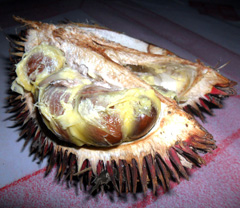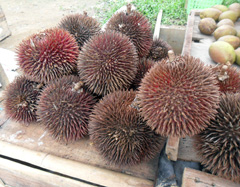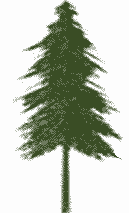 |
|
https://edibleplants.org/ |
 |
| https://edibleplants.org/ |
Translate this page:
Summary
Found in Southeast Asia specifically in Malaysia and Indonesia, Durio dulcis or Durian Marangang is a tropical large tree growing up to 43 m in height and 80 cm in trunk diameter with dark red to brown red spiny fruits that are edible. The flesh is dark yellow, thin, and deep caramel-flavoured. The seeds can be boiled or roasted then eaten. The wood is durable and used in interior construction, furniture, and packing cases.
Physical Characteristics

 Durio dulcis is an evergreen Tree growing to 30 m (98ft) by 25 m (82ft) at a medium rate.
Durio dulcis is an evergreen Tree growing to 30 m (98ft) by 25 m (82ft) at a medium rate.
See above for USDA hardiness. It is hardy to UK zone 10.
It is noted for attracting wildlife.
Suitable for: light (sandy), medium (loamy) and heavy (clay) soils and prefers well-drained soil. Suitable pH: mildly acid, neutral and basic (mildly alkaline) soils. It cannot grow in the shade. It prefers moist soil.
UK Hardiness Map
US Hardiness Map
Synonyms
Durio conicus Becc.
Plant Habitats
Edible Uses
Edible Parts: Fruit Seed
Edible Uses:
Fruit. The aril around the seeds is very sweet and fragrant[ 303 ]. An attractive, dark purplish-red colour when fully ripe, with a bright yellow aril that has a soft, creamy texture and a delicious flavour reminiscent of pineapple cream without the acidity[ 301 ]. Very strong smelling[ 303 ]. An extremely offensive odour[ 301 ]. This species of durian has the sweetest tasting and most ill-smelling fruits of the genus[ 301 ]. The globose fruit is up to 15 cm in diameter[ 303 ]. The fruit case is dark red to dark brown-red with slender 15-20 mm long spines, inside are a number of brown seeds each completely covered by a dark yellow tasty aril[ 303 ]. Seed - cooked[ 301 ]. They can be boiled or roasted[ 301 ].
References More on Edible Uses
Medicinal Uses
Plants For A Future can not take any responsibility for any adverse effects from the use of plants. Always seek advice from a professional before using a plant medicinally.
None known
References More on Medicinal Uses
The Bookshop: Edible Plant Books
Our Latest books on Perennial Plants For Food Forests and Permaculture Gardens in paperback or digital formats.

Edible Tropical Plants
Food Forest Plants for Hotter Conditions: 250+ Plants For Tropical Food Forests & Permaculture Gardens.
More

Edible Temperate Plants
Plants for Your Food Forest: 500 Plants for Temperate Food Forests & Permaculture Gardens.
More

More Books
PFAF have eight books available in paperback and digital formats. Browse the shop for more information.
Shop Now
Other Uses
Containers Furniture Wood
Other Uses: The heartwood is pink-brown[ 303 ]. The wood is probably one of the most important sources of durian timber in Sarawak[ 338 ]. The relatively durable wood is used in interior construction and for making cheaper types of furniture and packing cases[ 303 ]. We do not have any more information on the wood of this species. However, a general description of the wood for species in this genus is as follows:- The heartwood is pink-brown, red, or deep red-brown; it is not always sharply demarcated from the white, pale yellow-brown or light reddish-yellow sapwood. The texture is coarse; the grain straight to interlocked; somewhat lustrous; it is reported to have a foetid odour. The wood is not durable, and not resistant to termite attack; the sapwood is prone to powder-post beetle attack. It dries rapidly, but thin boards may tend to cup. The wood saws easily and generally dresses smoothly; nailing qualities are good. It is used for purposes such as furniture components, veneer and plywood, light construction[ 316 ].
Special Uses
Food Forest
References More on Other Uses
Cultivation details
A tree of the moist lowland tropics, it is found at elevations up to 800 metres[ 303 ]. Plants are found in the wild on sandy clay soils and friable clay loam[ 303 ]. The flowers are produced in short inflorescences that are clustered on older branches[ 303 ].
References Carbon Farming Information and Carbon Sequestration Information
Temperature Converter
Type a value in the Celsius field to convert the value to Fahrenheit:
Fahrenheit:
The PFAF Bookshop
Plants For A Future have a number of books available in paperback and digital form. Book titles include Edible Plants, Edible Perennials, Edible Trees,Edible Shrubs, Woodland Gardening, and Temperate Food Forest Plants. Our new book is Food Forest Plants For Hotter Conditions (Tropical and Sub-Tropical).
Shop Now
Plant Propagation
Seed -
Other Names
If available other names are mentioned here
Tutong, Lahong, Lajung, Durian merah, Durian bala, Pesasang, Dianjau, Durian tinggang, Duyen, Lahung, Lalit manuk, Pesasang, Layung
Native Range
TROPICAL ASIA: Indonesia, Kalimantan,
Weed Potential
Right plant wrong place. We are currently updating this section.
Please note that a plant may be invasive in one area but may not in your area so it's worth checking.
Conservation Status
IUCN Red List of Threatened Plants Status : Status: Vulnerable A1c

Growth: S = slow M = medium F = fast. Soil: L = light (sandy) M = medium H = heavy (clay). pH: A = acid N = neutral B = basic (alkaline). Shade: F = full shade S = semi-shade N = no shade. Moisture: D = dry M = Moist We = wet Wa = water.
Now available:
Food Forest Plants for Mediterranean Conditions
350+ Perennial Plants For Mediterranean and Drier Food Forests and Permaculture Gardens.
[Paperback and eBook]
This is the third in Plants For A Future's series of plant guides for food forests tailored to
specific climate zones. Following volumes on temperate and tropical ecosystems, this book focuses
on species suited to Mediterranean conditions—regions with hot, dry summers and cool, wet winters,
often facing the added challenge of climate change.
Read More
Expert comment
Author
Becc.
Botanical References
Links / References
For a list of references used on this page please go here
A special thanks to Ken Fern for some of the information used on this page.
Readers comment
| Add a comment |
|
If you have important information about this plant that may help other users please add a comment or link below. Only comments or links that are felt to be directly relevant to a plant will be included. If you think a comment/link or information contained on this page is inaccurate or misleading we would welcome your feedback at [email protected]. If you have questions about a plant please use the Forum on this website as we do not have the resources to answer questions ourselves.
* Please note: the comments by website users are not necessarily those held by PFAF and may give misleading or inaccurate information.
To leave a comment please Register or login here All comments need to be approved so will not appear immediately.
|
|